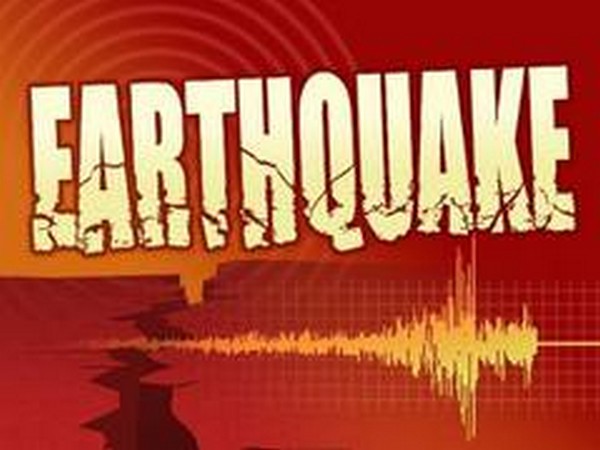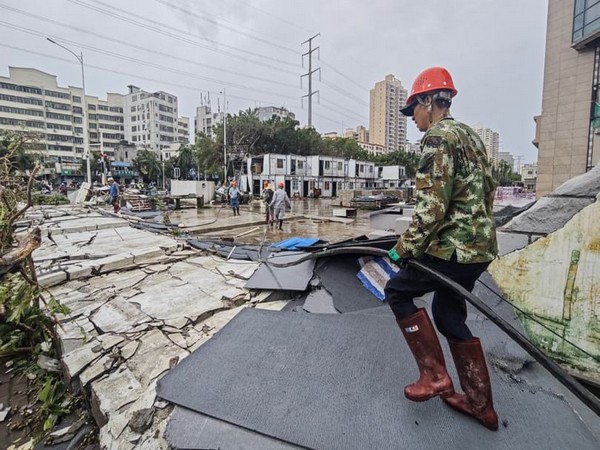
Earthquake strikes Haiti, collapses buildings, kills several people
Jun 07, 2023
Port-au-Prince [Haiti], June 7: A magnitude 5.5 earthquake struck Haiti's southwest region early Tuesday morning, destroying homes and creating panic in the country's Grand'Anse region, where heavy rains over the weekend washed away parts of a main bridge and left a trail of disaster.
Jerry Chandler, the head of the country's Office of Civil Protection, said at least three fatalities had been confirmed, along with 28 persons who were injured. Disaster responders are currently doing an assessment of the damages, he added.
One of the hardest hit areas is the neighborhood of Ste-Helene, a slum located inside the city where the three people are believed to have died. Ralph Simon, a local journalist who runs the online site JCOMHaiti, said that the people were killed when a house fell on top of another house.
"Where the house collapsed there is no way to get equipment in there so they are doing it all manually," he said. "People are trying to go in the rubble to see if they can find the bodies. But one body was removed and another is still inside. There is also a child that they have not yet found. That's why they are saying there are three people who died."
JCOMHaiti published some of the first images of the disaster, which showed buildings turned into rubble, some of the reported dozen injured and being treated for lacerations and people searching for loved ones in a collapsed whole of pink-colored concrete. One image showed a child face down buried under debris.
Claude Prepetit, Haiti's chief seismologist, told the Miami Herald the quake occurred around 5:11 a.m. and its epicenter was in the ocean between the cities of Abricots and Jeremie, located on the western edge of the country's southern peninsula.
"It was magnitude 5.5, which is a moderate earthquake," he said. "But it was still strong enough to create panic in all of the Grand'Anse all the way to Les Cayes. They told me that they felt the shaking."
Prepetit said he's been told that "a lot of damage was done and there are people who died."
This is the second earthquake to strike the area in two days. On Sunday morning, there was a magnitude 4.2 earthquake, said Prepetit, who was watching to see if there were aftershocks as is usually the case.
"All day yesterday, I was watching but I didn't see it replicated," he said.
Given that Tuesday's quake is far stronger than Sunday's, Prepetit said it's most likely that the most recent tremor, which occurred about 3 miles north of the previous one, is from a different fault line.
"That's the analysis currently taking place, which is these were two different earthquakes," he said.
Since Haiti's disastrous 2010 earthquake, Prepetit, a geologist by training and the director of Haiti's Bureau of Mines and Energy, has been overseeing a small seismic monitoring team in Port-au-Prince.
Solar-powered seismic stations located throughout country and a network of seismometers that record tremors in real time provide information on quakes via satellite and the network. The team than analyses the data and issues bulletins on quake activity.
This is why, he pointed out, they show the quake having a magnitude of 5.5 at a depth of 5.5 miles and the the U.S. Geological Survey had it registered at 4.9 magnitude. Haiti's monitoring equipment is located closest to the epicenter, he said.
Prepetit said since Aug. 14, 2021, when Haiti's southern peninsula was struck by a magnitude 7.2 earthquake that left hundreds dead, his team has had a particular focus on the Grand'Anse, Nippes and South regions of the country.
"From Aug. 14 until May 31, 2023, we've registered over 1,000 earthquakes in the Grand'Anse region." he said. "And three-fourths of them occurred in the ocean north of Jeremie from a fault line that we've identified and was reactivated after the Aug. 14 earthquake."
That particular line, known as the Northern Fault Line, he said, is very long with a lot of secondary fault lines, and it travels along the South to the northern coast of Haiti.
Bette Gebrian, who lives in the region, said while the quake "was surprisingly very short, about four or five seconds," it was very strong.
"We felt it," she said. "There are people all over town, walking around; walls are down. Everyone is calling everyone else, so that is a good thing, the phones are working. But it's scary as always."
"There has been no power in Jeremie since last January, and of course that makes things difficult if people need surgical intervention," she added. "People are flowing into the hospital but they are very short staffed because it's not really functional. We'll do what we can to share what we have for the injured."
Gebrian, a nurse, runs the only breast-cancer treatment center in the region through her nonprofit, Grand'Anse Health and Development. Her husband, Edwin, runs a small guest house.
The region - or Haiti - she said, can't seem to get a break.
Following heavy rains and flooding over the weekend, the country's
Civil Protection agency and United Nations humanitarian experts have
been trying to get aid out to eight regions that were heavily
affected by the storms. At least 42 people had been confirmed dead
and over 30,000 affected. Thousands have been left homeless after
their houses were flooded when roads turned into raging rivers of
brown water carrying debris.
More rains are expected this week, fuelingworrieds among
humanitarian officials contending with a search and rescue operation
in Jeremie and the possibility of more flooding and mudslides,
While Port-au-Prince, which was struck by the devastating earthquake
in 2010, was the most heavily affected by the recent rains, the
southwest region wasn't spared. The main bridge connecting the
coastal city of Jeremie to the rest of Haiti was cut off when part of
it was submerged by flood waters, washing away portions of the off
ramp. The bridge was installed 10 months ago to replace another
bridge that had collapsed during the 2021 earthquake.
"It was just horrific," Gebrian said. "Everyone was just watching the
bridge..the soil tumbled down."
Prior to this weekend's torrential rains, it had not rained in the
region for five months, leading to shortages of food among the
residents, many of them farmers.
"You can't get food in, you can't get things out when the gangs are
active," she said, adding that the latest disasters are adding
"Insult to injury."
# Notebook
Source: Qatar Tribune









